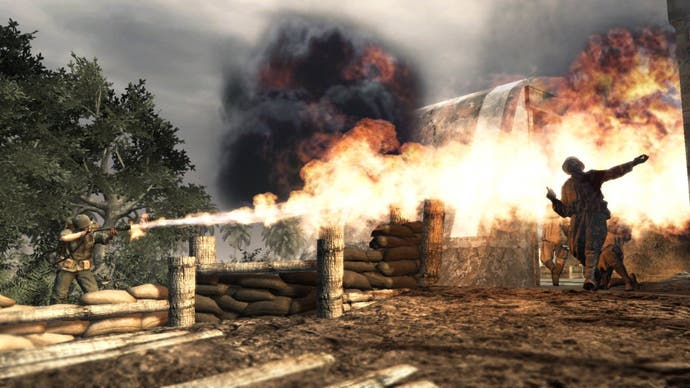Call of Duty: World at War
Competitive co-op.
A London press event over fifty years after World War II, and it's still being fought. At least for one last time, as this Call of Duty - reading between the lines - seems to be Treyarch's capstone to the period. And another battle quickly surfaces when I ask producer Noah Heller, who handles the game on the Activision side, about whether the developer feels upset about how they're viewed, considering they turned around the maligned Call of Duty 3 in less than a year. Do the angry internet men frustrate him?
"You know? I agree with them," says Heller. "People online shouldn't forgive us because we made an okay game in nine months. As a company, Activision made a decision to only give us nine months. And the consumer should be mad because development teams aren't given enough time to make games. I don't want them to turn around and say, 'You guys did fine with the time you had - good on you! Good effort!' but I would like them to come back and say, 'I'm not going to judge you based on that now that I know what you had to make that game. I'll give you a second chance'."
Perhaps the good thing is that, after all the doubt, Call of Duty: World at War actually looks like redeeming Treyarch's reputation. The press event ties in with the recent beta, as well as showing off the co-op parts of the game. "It's pretty late for a beta," admits Heller, "but what we get from it is a lot of background work - with our network and understanding where the traffic is going back and forth. Stuff we get from the beta may help with the patch, if we end up doing one, but probably more importantly for downloadable content."

A late beta is an increasing trend - betas becoming the new demos, effectively. Because while the caveat that it's not a real version is always there, people judge them as exactly that. "It's a challenge. There's a tension between it being good enough so the players get excited about the game, and it has to be early enough so it can help us make decisions on the game," says Heller.
The co-op play is the bigger change to the Call of Duty formula. Four-player multiplayer online, with a couple playable in split-screen, is a fundamental difference. I get to play a couple of missions, one from the push into Berlin towards the Reichstag and another in the pacific theatre. On one level, it's familiar - there's always been friends with you in Call of Duty, they just haven't actually been real people - but on another, it changes everything. It doesn't go as far as Gears of War or any of its followers in being heavily co-op specific, but there are multiple routes in certain areas. "We tried a couple of different things," says Heller, "like co-op puzzles where you have to come from this angle, and you have to come from this angle. It just didn't feel like Call of Duty. What we want is the red-shirts on your armies. We wanted them to be your buddies, not just some guy who comes in and dies."
So while we're dealing with a corridor shooter, it's a wider corridor to make room for your comrades. All the levels, bar two, can be played in this way. (One, because it's a sniper mission, and the other because it's the classic on-rails shooter aboard a machinegun-covered Blackcat or Toothrat or Bosscat or something. Which is a kind of plane, apparently).








